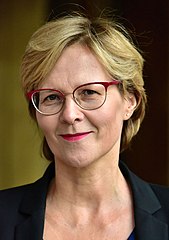22 października (czwartek) o godz. 13:00 odbędzie się w formie zdalnej pierwsze w roku akademickim 2020/2021 seminarium. Wystąpienie „Why do we believe in rankings? The global institutionalization of university rankings and its discontents” wygłosi Jelena Brankovic (Uniwersytet Bielefeldzki). Pierwszy głos w dyskusji zabierze Adam Płoszaj (EUROREG UW).
Spotkanie ma charakter otwarty i odbędzie się w języku angielskim na platformie ZOOM w godzinach 13:00-15:00 (Meeting ID: 986 9792 408). Osoby zainteresowane udziałem prosimy o kontakt z organizatorami w celu uzyskania hasła (e-mail: is@spoleczenstwo.pl lub mikolajpawlak@uw.edu.pl).
 Dr. Jelena Brankovic is a postdoctoral researcher at the Faculty of Sociology, Bielefeld University (Germany). Her current research focuses on the role rankings and other forms of comparison in the institutional dynamics within and across sectors, with a particular attention to the higher education sector. Her interests also extend to the practice of theorizing, academic writing, peer learning, and cats (even though she has none, unfortunately). Jelena is also Books Editor at Higher Education and a Joint Lead Editor of the ECHER Blog.
Dr. Jelena Brankovic is a postdoctoral researcher at the Faculty of Sociology, Bielefeld University (Germany). Her current research focuses on the role rankings and other forms of comparison in the institutional dynamics within and across sectors, with a particular attention to the higher education sector. Her interests also extend to the practice of theorizing, academic writing, peer learning, and cats (even though she has none, unfortunately). Jelena is also Books Editor at Higher Education and a Joint Lead Editor of the ECHER Blog.
 Dr Adam Płoszaj is an assistant professor at the Centre for European Regional and Local Studies EUROREG, University of Warsaw. My primary area of expertise is regional and local development, R&D policy, science of science, and policy evaluation, including evaluation of European Union programmes and projects.
Dr Adam Płoszaj is an assistant professor at the Centre for European Regional and Local Studies EUROREG, University of Warsaw. My primary area of expertise is regional and local development, R&D policy, science of science, and policy evaluation, including evaluation of European Union programmes and projects.
Przed seminarium zachęcamy do zapoznania się z artykułem:
Abstrakt wystąpienia
Academic rankings have been around for more than a century, yet only recently have we started paying attention to them. Although not exclusive to academic establishments, rankings in the higher education sector have rapidly proliferated since the turn of the century—a trend which could be accounted for, at least in part, by developments beyond higher education. The rise of metrics, proliferation of evaluative practices, marketization, scientization, and globalization in the broadest sense, are some of the often recognized drivers of this trend. At the same time, rankings are also highly contested. However, despite the unremitting challenge to their legitimacy and the controversy which clouds them, the idea that rankings are “here to stay” seems to have sunk in with scholars, decision makers, and practitioners alike. How can we, then, account for what this seeming paradox?




 wystąpienie pt. „Stalling the State: how Uber profits from delaying the enforcement and adoption of regulation” wygłoszą Marcin Serafin (IFiS PAN), socjolog kierujący
wystąpienie pt. „Stalling the State: how Uber profits from delaying the enforcement and adoption of regulation” wygłoszą Marcin Serafin (IFiS PAN), socjolog kierujący 

 Pierwszy głos w dyskusji zabierze dr Andrzej Ancygier, starszy analityk w Climate Analytics i wykładowca New York University oraz Freie Universität Berlin [
Pierwszy głos w dyskusji zabierze dr Andrzej Ancygier, starszy analityk w Climate Analytics i wykładowca New York University oraz Freie Universität Berlin [








 wystąpieniem: „Wadliwe” głosy w systemach PR i SMD: wyższa frekwencja pochodzi z głosów niższej jakości. Dowody z polskich wyborów lokalnych 2010 i 2014, które wygłosi znakomity ekspert w zakresie analizy systemów wyborczych, powracający po 3 latach na nasze seminarium – Marek Kamiński z University of California, Irvine
wystąpieniem: „Wadliwe” głosy w systemach PR i SMD: wyższa frekwencja pochodzi z głosów niższej jakości. Dowody z polskich wyborów lokalnych 2010 i 2014, które wygłosi znakomity ekspert w zakresie analizy systemów wyborczych, powracający po 3 latach na nasze seminarium – Marek Kamiński z University of California, Irvine  (współautorem referatu jest Jarosław Flis, UJ). Pierwszy głos w dyskusji zabierze Jacek Haman (UW).
(współautorem referatu jest Jarosław Flis, UJ). Pierwszy głos w dyskusji zabierze Jacek Haman (UW). wygłosi znany socjolog instytucji, jeden z najbardziej doświadczonych badaczy polskiej transformacji, Andrzej Rychard (IFiS PAN) [
wygłosi znany socjolog instytucji, jeden z najbardziej doświadczonych badaczy polskiej transformacji, Andrzej Rychard (IFiS PAN) [ M. Dudzińska (WSNSiR UW) [
M. Dudzińska (WSNSiR UW) [